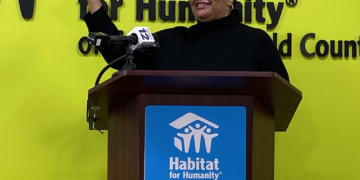Let”™s see, the dog days of August, pre-Labor Day weekend checklist:
- Clean grill for last summer hurrah;
- Recharge smartphone for return from vacation;
- Cash in all stocks until October has passed.
Autumn fast approaches ”“ or should we say the fall?
Seems like just about every year, people return from their summer vacations, raring to get back into roaring business life, only to see the economic football yanked out from under us by an economic personification of Lucy Van Pelt.
Last August, of course, it was a freefall in the stock markets caused by the European sovereign debt crisis, followed locally by the havoc of Tropical Storm Irene. In September 2008, it was the collapse of Lehman Brothers; in 2005, the destruction of Hurricane Katrina; in 2001, the double hammer of the 9/11 attacks and Enron.
So when Federal Reserve Chairman Ben Bernanke suggests the U.S. economy is still in a fragile state heading into September, it”™s time to duck and cover.
“Textbooks describe economics as the study of the allocation of scarce resources,” Bernanke said in a videotaped speech in early August. “That definition may indeed be the ”˜what,”™ but it certainly is not the ”˜why.”™Â The ultimate purpose of economics, of course, is to understand and promote the enhancement of well-being.”
Bernanke pointed out that Bhutan abandoned altogether tracking gross national product 40 years ago, in favor of a Gross National Happiness index. More recently, the Organisation for Economic Co-operation and Development created a “better life index” that cross-checks the national moods globally (at oecdbetterlifeindex.org, you can weight the varying inputs according to how important each is to you, be it income, health, and work-life balance among others).
The United States performs very well in overall measures of well-being, according to OECD.
“Money, while it cannot buy happiness, is an important means to achieving higher living standards,” the Paris-based organization states on its website. “In general, Americans are more satisfied with their lives than the OECD average, with 76 percent of people saying they have more positive experiences in an average day (feelings of rest, pride in accomplishment, enjoyment, etc) than negative ones (pain, worry, sadness, boredom, etc).
It could be you prefer the 1988 Bobby McFerrin “don”™t worry, be happy” refrain.
If each fall brings its share of worry, it”™s seldom boring anyway. March comes in like a lion, and the same could be said of September.
Bring it.
HED: Tribe bets on AC
If the economy isn”™t roaring back into motion heading into the fall elections, you can”™t blame the operators of Mohegan Sun for trying to instill the spirit of the Roaring Twenties in their general neighborhood.
In what is reportedly the first entry by a Native American group into a traditional U.S. gambling mecca, the Mohegan Gaming Tribal Authority will take over operations at the venerated Resorts Casino Hotel in Atlantic City, N.J.
The Mohegan Gaming Tribal Authority runs the Mohegan Sun Resort and Casino in eastern Connecticut, as well as Mohegan Sun at Pocono Downs in Wilkes-Barre, Pa. It has proposed another expansion north of the Connecticut border in Palmer, Mass.
The Resorts was the first legally sanctioned casino to open in the United States outside Las Vegas, in 1978, and its owners at one point included entertainment titan Merv Griffin. In 2010, it was bought by DGMB Casinos L.L.C. for a reported $34 million, which renovated it to reflect a theme of the Roaring Twenties era, on the heels of HBO”™s hit series “Boardwalk Empire.”
Of course, the show covers the period encompassing the Great Depression as well, but that is beside the point. Thirty Emmy nominations says something about the nostalgia we have for the good old days.



















